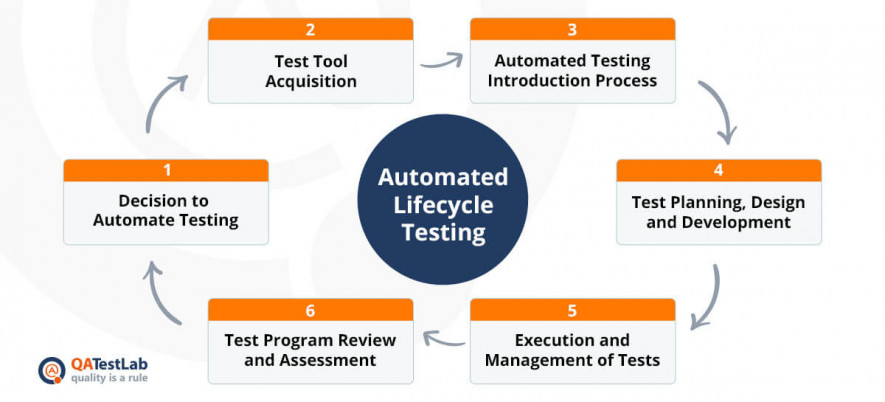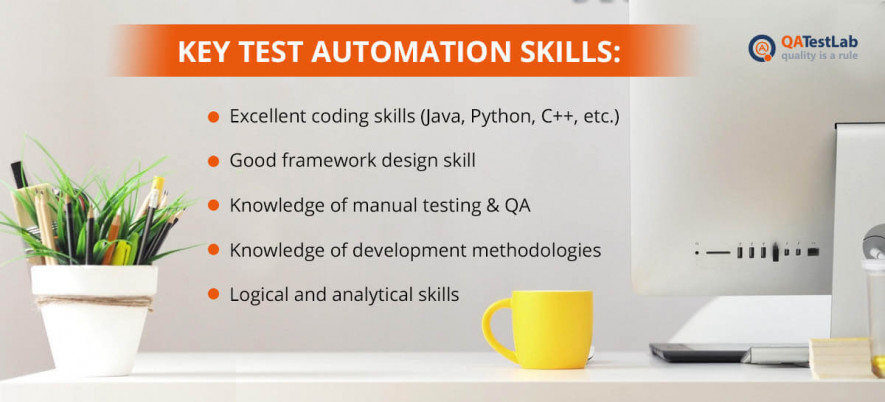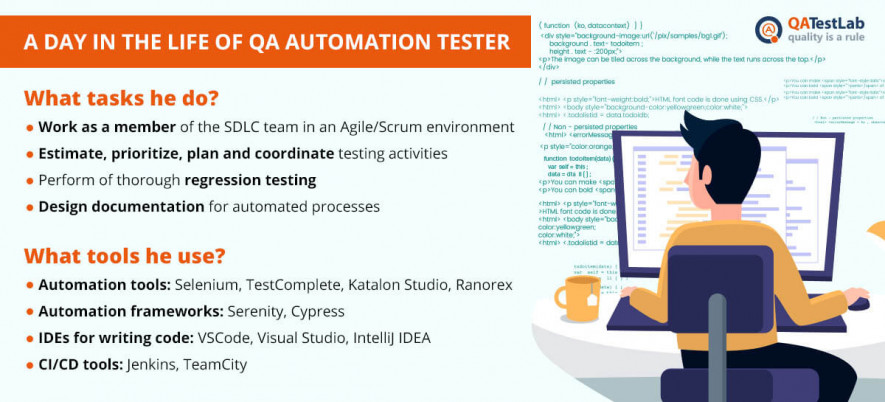Automation QA engineer skills & responsibilities
by Kate Libbie | March 26, 2020 12:18 pm
Technical tester[1], developers in testing, and even QA-SDET – today, Automation QA engineers have a variety of names. Automation is continuously improving and demanding creative, progressive, and problem-solving thinking. It is no surprise why does this job title receive much attention.
Some consider the QA Automation tester has the skills of a programmer and the logic of a manual tester[2]. But if to go deeper, you will see a much broader picture. So, how does it look? What set of skills necessary to ride the wave of QA automation? QATestLab[3] has the answer.
What is QA Automation Testing?
Comparing to the ordinary path of a manual tester, the story for automation[4] is diametrically different. Everything starts with a vital purpose, which is to create scripts. These scripts are designed to check the program’s operation after test cases crafted by the manual tester. As a result, such an approach reduces time, and to simplifies the testing process and leaves everyone happy.
What Automation tester does most of his time? With the aid of tools[5], he designs, builds and deploys test resolutions. The final goal is fairly simple – to automate a maximum amount of tasks with the smallest snippet of code. All this eventually helps to implement testing procedures much faster rather then it was done with manual forces.

Automated Lifecycle testing is comprised of lots of actions, but the most important thing is to compare the actual and expected results and generate detailed test reports. The central mission is to see the strong and weak sides of a product, check quality comparing it with the requirements, and understand the way for its improvement. This task streamlines the whole quality assurance process and makes more robust strategies for testing.
QA Automation engineer skillset

Here some of the most essential skills you should acquire:
#1 Excellent coding skills
To write a practical automation test script, you need to have a general understanding of computer science and good intermediate or advanced knowledge of at least one programming language. As a rule, an engineer has a solid understanding of languages: C/C++, Java, SQL, Python. This especially comes in handy when there is a need to communicate with the developer and to conduct in-depth functionality testing. Although in automation, there is also Scriptless-based testing[6], it is impossible without a general understanding of the art of coding.
#2 Framework design skill
Automation QA engineers deal with designing a robust, optimized framework that catches bugs along with regular business workflows. Very often, in such cases, testers get the project done by the developer, and it can be done in any language. Automation engineers should have a basic understanding of this coding language or spend some time learning it.
#3 Knowledge of manual testing & QA
Yes, it’s not a mistake. Why is it important? Automation is a machine, and a machine only does what it is told to do. Whenever something goes wrong, the human eye can detect it easily. But when it comes to automated scripts, it becomes more challenging to detect visual points.
#4 Knowledge of development methodologies
Knowing how to conduct automation testing is good, but no less important is to understand how to organize the testing procedures inside of a team, and how to communicate with your customer. Development methodologies such as Scrum, Agile are essential things to propel your career. You should know how it works and be ready to follow a specific system. For example, during Scrum meetings, you should know how to avoid awkward situations and know how to present your problem in the right way in front of your colleagues and customer.
#5 Logical and analytical skills
Last but not least point is thinking. Yes, automation QA has a certain mindset. He is not a developer, but he also far away from standard thinking of manual tester, which is a motto that sounds like ‘how to break it?’. He should get the idea of what is the critical priority for a product. He should have developed logical and abstract thinking; to be able to analyze; to love complex tasks; to be diligent and attentive to details.
QA Automation engineer core duties

Well, to understand more what automation is, it is necessary to look behind the curtain of automation QA daily routine: what he does and what tools does he use? Let’s figure it out.
Here are the core duties of Automation QA engineer:
- Write scripts & handle test cases. The first and foremost attention is on automated test cases. Usually, an engineer writes, executes, and monitors them. The most important thing is to think about how to write scripts more effectively.
- Write Documentation. Automation QA without this aspect it’s more like a joke.
- Use Tools & Design Frameworks. The work of automation tester is impossible without the needed tools and frameworks. There are several essential instruments: tools like Selenium, Katalon Studio, Ranorex); and frameworks.
- Know IDEs. QA should have good knowledge of working with IDEs like Visual Studio.
For some, this list may seem too big, but every professional Automation QA engineer will say you that there is no limit for perfection and progress.
Final Word: What makes a good QA Engineer?
Although there are lots of skills and responsibilities to learn, you have all the chances to acquire them from scratch. Automation is something in the middle of development and testing, this path is different yet interesting. But this path impossible without your passion.
Stay tuned and subscribe to our blog[7] if you haven’t yet. Tap into the power of testing with QATestLab.
Learn more from QATestLab
Related Posts:
- Technical tester: https://blog.qatestlab.com/2015/12/08/non-technical-tester/
- the logic of a manual tester: https://blog.qatestlab.com/2019/07/25/manual-testing-skills/
- QATestLab: https://qatestlab.com/services/
- automation: https://qatestlab.com/services/test-automation/
- tools: https://blog.qatestlab.com/2018/03/27/tes-automation-frameworks/
- Scriptless-based testing: https://blog.qatestlab.com/2020/03/04/scriptless-automated-testing/
- our blog: https://blog.qatestlab.com/
- 6 Steps To Automate Your Testing Process: https://blog.qatestlab.com/2024/04/15/6-steps-to-automate-your-testing-process/
- Test Automation 101: Should The Programming Languages of Your Software and Autotests Match?: https://blog.qatestlab.com/2023/02/08/programming-languages-for-autotests/
- Calculating the Return on Investment (ROI) of Test Automation: https://blog.qatestlab.com/2020/09/23/calculating-the-return-on-investment-roi-of-test-automation/
Source URL: https://blog.qatestlab.com/2020/03/26/automation-skills-responsibilities/

